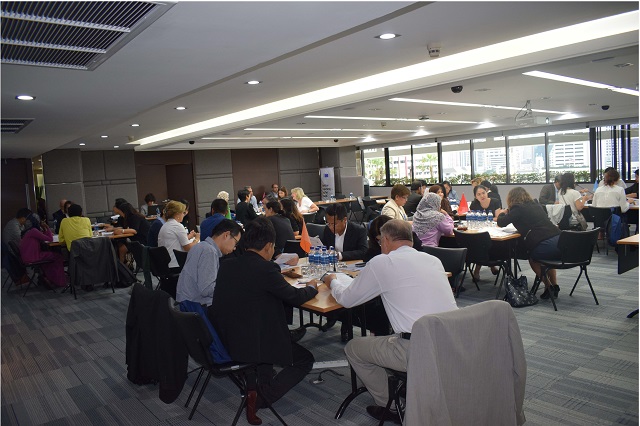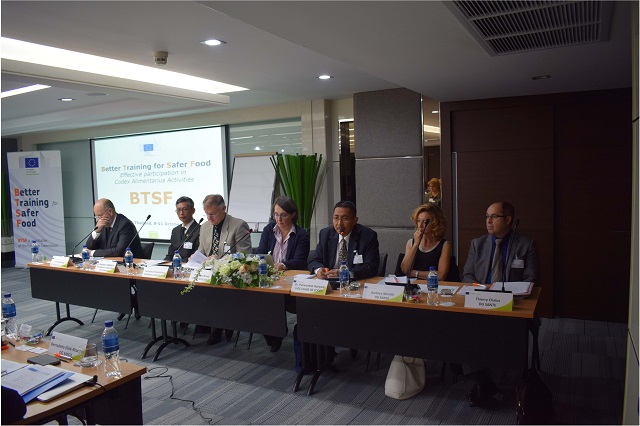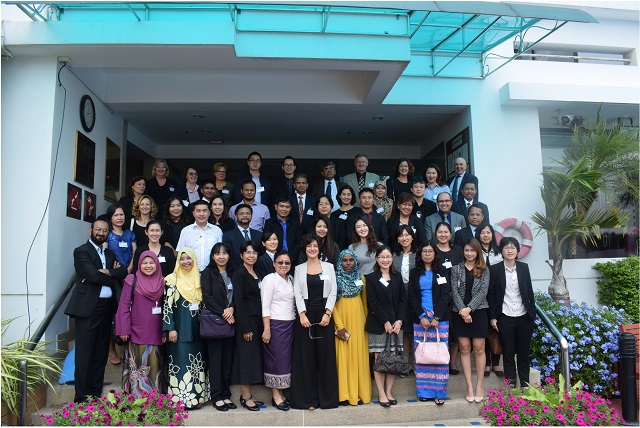Safer Food Training for effective participation in Codex
Bangkok October 11 2017
In some ways the premise is very simple: build stronger Codex coordination at the country level, use Codex standards in national legislation, and then begin to influence which standards are developed in Codex to protect the needs of consumers or to seize a particular trade opportunity.
However the realty in some countries is that the level of technical knowledge, skills, capacity and resources to actively and effectively participate in Codex is still under development. Countries need buy-in and coordination from high levels of government so that investment is solid and sustainable and a country is able to reap the benefits of engagement with international standard setting. There are many competing voices for resources in a country when it comes to issues that touch health, agriculture and trade.
Countries with long-established Codex systems are well placed to take their expertise to places around the world. Capacity building is a cornerstone of the mandate of Codex and at the heart of the work of the parent organizations FAO and WHO.
Better Training for Safer Food
One such initiative is the European Union Better Training for Safer Food (BTSF) programme which covers food and feed law, animal health, welfare and plant health rules.

BTSF Workshop
Two events were organized by the EU: in Santiago del Chile in December 2016 for the CCLAC region and currently in Bangkok (Thailand) for the CCASIA countries (9-11 October 2017) with the overall objective to strengthen countries’ capacity to participate actively in the work of international standard-setting bodies.
This means strengthening technical capacity of national delegates to enable them to better contribute to standard setting as well as equipping them with the potential to develop harmonized national and regional positions ahead of Codex meetings. The workshops focus on the structure and functioning of Codex, including the elaboration of Codex standards. To ensure an accurate understanding of Codex procedures, the participants are actively involved in case studies and simulation exercises including a mock session of a Codex Committee meeting.
A unique opportunity
Raising awareness and promoting effective participation in Codex.

Senior Food Standards Officer Annamaria Bruno (in the centre of the above photo) is attending the Bangkok event to provide expert advice and practical experience of Codex from the Secretariat perspective. “Workshops of this type are a unique opportunity for the Secretariat to listen and understand the level of knowledge of Codex members and the impediments to effective participation in Codex work.”
“These events contribute to raising awareness and promoting effective participation in Codex,” and this is key if a country is to “actively participate in Codex work and promote the use of Codex standards at national level. We also hope events of this type can help participants develop networks and a common understanding of Codex work and standard setting procedures.”
Enhancing inclusiveness
Guilherme da Costa, Chair of the Codex Alimentarius Commission said: “This kind of initiative is extremely important for Codex Members since it strengthens capacity building for better participation by Members in Codex work.” He also emphasized that by attending a Codex capacity building event, with a balanced theoretical and practical programme, participants can improve their ability to contribute and to enhance inclusiveness in the Codex arena.

BTSF Participants Bangkok 9-11 October
Links
https://eeas.europa.eu/delegations/thailand/area/press_en
At the heart of the Codex mandate are the core values of collaboration, inclusiveness, consensus building and transparency. Governmental and non-governmental, public and private organizations alike play a vital role in ensuring Codex texts are of the highest quality and based on sound science.
Codex would have little authority in the field of international standard setting if it did not welcome and acknowledge the valuable contributions made by observers. Expert technical bodies, industry and consumer associations
contribute to the standard-setting process in a spirit of openness, collaboration and transparency.
Intergovernmental organizations (IGOs) and international non-governmental organizations (NGOs) can apply for observer status in Codex in order to attend and put forward their views at every stage of the standard-setting process.
 Current Codex Alimentarius Commission
Current Codex Alimentarius Commission
Safer Food Training for effective participation in Codex
Bangkok October 11 2017
In some ways the premise is very simple: build stronger Codex coordination at the country level, use Codex standards in national legislation, and then begin to influence which standards are developed in Codex to protect the needs of consumers or to seize a particular trade opportunity.
However the realty in some countries is that the level of technical knowledge, skills, capacity and resources to actively and effectively participate in Codex is still under development. Countries need buy-in and coordination from high levels of government so that investment is solid and sustainable and a country is able to reap the benefits of engagement with international standard setting. There are many competing voices for resources in a country when it comes to issues that touch health, agriculture and trade.
Countries with long-established Codex systems are well placed to take their expertise to places around the world. Capacity building is a cornerstone of the mandate of Codex and at the heart of the work of the parent organizations FAO and WHO.
Better Training for Safer Food
One such initiative is the European Union Better Training for Safer Food (BTSF) programme which covers food and feed law, animal health, welfare and plant health rules.

BTSF Workshop
Two events were organized by the EU: in Santiago del Chile in December 2016 for the CCLAC region and currently in Bangkok (Thailand) for the CCASIA countries (9-11 October 2017) with the overall objective to strengthen countries’ capacity to participate actively in the work of international standard-setting bodies.
This means strengthening technical capacity of national delegates to enable them to better contribute to standard setting as well as equipping them with the potential to develop harmonized national and regional positions ahead of Codex meetings. The workshops focus on the structure and functioning of Codex, including the elaboration of Codex standards. To ensure an accurate understanding of Codex procedures, the participants are actively involved in case studies and simulation exercises including a mock session of a Codex Committee meeting.
A unique opportunity
Raising awareness and promoting effective participation in Codex.

Senior Food Standards Officer Annamaria Bruno (in the centre of the above photo) is attending the Bangkok event to provide expert advice and practical experience of Codex from the Secretariat perspective. “Workshops of this type are a unique opportunity for the Secretariat to listen and understand the level of knowledge of Codex members and the impediments to effective participation in Codex work.”
“These events contribute to raising awareness and promoting effective participation in Codex,” and this is key if a country is to “actively participate in Codex work and promote the use of Codex standards at national level. We also hope events of this type can help participants develop networks and a common understanding of Codex work and standard setting procedures.”
Enhancing inclusiveness
Guilherme da Costa, Chair of the Codex Alimentarius Commission said: “This kind of initiative is extremely important for Codex Members since it strengthens capacity building for better participation by Members in Codex work.” He also emphasized that by attending a Codex capacity building event, with a balanced theoretical and practical programme, participants can improve their ability to contribute and to enhance inclusiveness in the Codex arena.

BTSF Participants Bangkok 9-11 October
Links
https://eeas.europa.eu/delegations/thailand/area/press_en
 Codex and Observer
Codex and Observer
around the world since ancient times.
We might not always know where it comes from,
but we expect it to be available, safe and of good quality.










Leave a comment